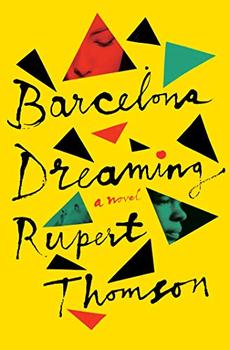Summary | Excerpt | Reviews | Beyond the Book | Read-Alikes | Genres & Themes | Author Bio

This article relates to Barcelona Dreaming
 Readers of Barcelona Dreaming will notice that soccer player Ronaldinho is mentioned frequently throughout the novel. Although not one of the chief protagonists, his presence in Barcelona — and by extension in the lives of the book's characters — is a constant.
Readers of Barcelona Dreaming will notice that soccer player Ronaldinho is mentioned frequently throughout the novel. Although not one of the chief protagonists, his presence in Barcelona — and by extension in the lives of the book's characters — is a constant.
Who is Ronaldinho and why does he feature so significantly in this novel?
Ronaldinho was born Ronaldo de Assis Moreira on March 21, 1980. In a 2019 article, the international football magazine FourFourTwo placed him fifth on its list of "101 greatest football players of the last 25 years" in the sport called football or soccer, depending on where you live. Ronaldinho was born in Brazil where he first started playing football at age eight. Even then, he was identified as a rising star. His nickname originates from frequently being the smallest and youngest member of the team — the suffix "inho" means "small" in Brazilian Portuguese.
Following his older brother, Ronaldinho joined the Grêmio youth squad in 1998 (at age 18), and in 1999 he joined the senior squad, scoring 22 goals in 47 matches. Shortly thereafter he signed with the Paris Saint-Germain team and then joined Futbol Club (FC) Barcelona, also called Barça, in 2003.
FC Barcelona had been struggling for a long time. In 1978, the club's members elected its president for the first time. This action was closely linked with the end of the dictatorship of General Francisco Franco and Spain's transition to democracy. The new club president, Josep Núñez, was determined to create a world-class football team. But, in the early 1980s, an ultra-left group named Boixos Nois ("Crazy Boys" in English) associated with Barça emerged. Boixos Nois was strongly influenced by the skinhead movement which originated with the working-class youths in London — initially in the 1960s, and then in a second wave in the late 1970s. Núñez's was very unpopular with this group. Boixos Nois repeatedly demanded his resignation and consistently criticized him at matches with chants and banners, sometimes even inciting violence.
Núñez resigned in 2000 after his failure to emulate the success of Barça's great rival, Real Madrid. The club floundered for the following three years. After a disastrous season in early 2003, a new president and manager brought about a reversal of Barça's fortune. One of the strategies to achieve this turnaround was the signing of a number of international players, including Ronaldinho. In his second season with FC Barcelona, Ronaldinho won his first FIFA World Player of the Year award and Barcelona won the 2004-2005 La Liga title.
The following season was even more successful for both Ronaldinho and for Barça. He played a significant role in the club's winning of the 2005-06 UEFA Champions League for the first time in 14 years as well as another La Liga title. Ronaldinho was awarded the 2005 Ballon d'Or (Golden Ball), a prestigious individual award voted on by football journalists, team captains and coaches and given to the player who performed best over the previous season. He was also awarded his second FIFA World Player of the Year award.
In 2008, the year in which Barcelona Dreaming is set, Ronaldinho played his 200th match for Barça. But in this season, he was plagued by injuries, and the most serious — a muscle tear — prematurely ended his season. He had been a model player for his first three seasons at Barça but his partying lifestyle and decreasing commitment to training meant that his physical capacity was declining. In 2008, the club president made it clear that Ronaldinho would need to move on from FC Barcelona.
In July, Ronaldinho signed with Associazione Calcio Milan or AC Milan – and left FC Barcelona. His departure was reported by Simon Baskett of Reuters:
Ronaldinho joined Barca as a toothy-grinned wizard who had the club under his spell for three glorious seasons. He will leave a rather forlorn figure. Whether his magic has been exhausted or he just needs a new challenge remains to be seen.
In Barcelona Dreaming, a character named Ignacio describes his response to the news: "I felt such a profound sense of abandonment that I stood quite motionless."
Ronaldinho continued to play football for a number of clubs (notably Milan and Querétaro in Mexico) but arguably did not reach the level of success he enjoyed in Barcelona. On January 16, 2018, his brother/agent announced Ronaldinho's retirement.
Soccer player Ronaldinho, courtesy of FC Barcelona
Filed under People, Eras & Events
![]() This article relates to Barcelona Dreaming.
It first ran in the August 18, 2021
issue of BookBrowse Recommends.
This article relates to Barcelona Dreaming.
It first ran in the August 18, 2021
issue of BookBrowse Recommends.
Your guide toexceptional books
BookBrowse seeks out and recommends the best in contemporary fiction and nonfiction—books that not only engage and entertain but also deepen our understanding of ourselves and the world around us.